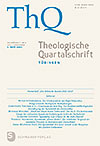archivierte
Ausgabe 4/2022 |


 |
      |
 |
|
|
|
|
 |
|
| Leseprobe 2 |
DOI: 10.14623/thq.2022.4.455–469 |
|
| Eamonn Conway |
| Synodality: Last Chance for the Irish Church? |
 |
Zusammenfassung
In Irland finden derzeit zwei synodale Prozesse statt. Der erste ist ein „Synodaler Weg“ für die katholische Kirche in Irland, der zur Abhaltung einer oder mehrerer „Nationaler synodaler Versammlungen“ innerhalb der nächsten fünf Jahre führt. Der zweite ist die Teilnahme der Kirche in Irland an der Ordentlichen Bischofssynode 2021–2024. Das erste ist der von einer neuen Generation von Bischöfen ausgearbeitete Strategieplan für die Erneuerung der katholischen Kirche in Irland, wobei der Schwerpunkt derzeit auf der Konsultation als Teil des globalen synodalen Prozesses liegt. In diesem Artikel werden der Kontext und der Hintergrund der in Irland laufenden synodalen Prozesse erläutert und die Ergebnisse der Konsultationsphase zusammengefasst und analysiert. In dieser Phase wurden drei Hauptthemen herausgearbeitet: die Rolle der Frauen in der Kirche, die Transparenz in Bezug auf die Entscheidungsfindung innerhalb der Kirche und die Einbeziehung derjenigen, die als marginalisiert und an der Peripherie betrachtet werden.
Abstract
Two synodal processes are currently underway in Ireland. The first is a Synodal Pathway for the Catholic Church in Ireland leading to the holding of a National Synodal Assembly or Assemblies within the next five years. The second is the Church in Ireland’s participation in the Ordinary Synod of Bishops 2021–2024. The former is a strategic plan for a new generation of bishops and the renewal of the Catholic Church in Ireland. However, the current focus is on consultation as part of the global synodal process. This article provides context and background to the synodal processes underway in Ireland and summarises and analyses the outcomes from the consultation phase. This phase identified three main themes: the role of women in the Church; transparency regarding wider participation in decision-making within the Church; and the inclusion of those considered marginalised and on the peripheries of the Church.
Keywords
Irland; Papst Franziskus; Synodalität; Führung; Laien; Zweites Vatikanum; Konsultation; Unterscheidung; Einbeziehung; Synode; Bischöfe Ireland; Pope Francis; Synodality; Leadership; Laity; Vatican II; consultation; discernment; inclusion; Synod; Bishops
Introduction and Background
In May 2018, a conference took place in Dublin provocatively titled ‘Five years to save the Irish Church’. Five years have now almost passed and, regrettably, the intervening period has seen little evidence that the Irish Church’s salvation is closer to hand. In fact, a few months after that conference a major event happened in the Irish Church which, if anything, only made matters worse and possibly set the renewal of the Irish Church back even further.
The Irish episcopal conference requested permission to host the 2018 World Meeting of Families presided over by Pope Francis. The Catholic Church in Ireland threw all its personnel and financial resources into holding this week-long event. It is generally agreed, but less openly acknowledged, that the event turned out to be an ‘own goal’. In Vatican circles, in terms of papal visits by Pope Francis, it was ranked near the bottom alongside his pastoral visit to Chile early that same year. In Ireland, the Pope’s prepared homilies seemed off the mark in terms of recognising and responding to the realities of the Church in contemporary Ireland. His speeches did not seem to sufficiently consider the pervasive anger and resentment, giving way to apathy, that now persists towards the Church in Ireland. Pope Francis had to change his schedule to accommodate impromptu meetings with victims of sexual violence and neglect in Church-run institutional homes. He also had to compose a detailed apology to them overnight, which he delivered in Spanish at the main liturgy of his pastoral visit. The events and liturgies, though well-organised, attracted far fewer participants than anticipated by the organisers; and the media utilised the rows of empty seats at the various gatherings as a visual representation of a dishevelled and depleted Catholic community in Ireland. By contrast, the country’s then Prime Minister won the moral high ground in terms of articulating what was popularly acclaimed as a fair, mutually respectful and somewhat distancing position regarding Church-state relations. In addition, those hostile to the Church were given unbridled access to the media, while Church-friendly commentators, among them journalists, bishops and theologians, often came across as ill-informed, poorly briefed and defensive. In short, many felt that the 2018 World Meeting of Families in Ireland felt more funereal than festive, and four years later it is impossible to point to any concrete positive or enduring outcomes.
Strategically, the 2018 World Meeting of Families was intended to contribute globally to the embedding of Amoris Laetitia into the life of the Church; the exhortation that followed the two synods of bishops on marriage and the family (2014 and 2015). In the lead-up, many pastors and theologians in Ireland worked hard to communicate as widely as possible an accurate understanding of the pastoral solutions proposed by the exhortation for people in irregular unions. Unfortunately, they did so with little success, mainly because the Irish episcopal conference, unlike many other episcopal conferences, provided no guidelines in relation to the exhortation and did not endorse it as a body of bishops. No Irish diocese took meaningful steps to implement what Amoris Laetitia proposed. After the World Meeting of Families, whatever little momentum there had been in Ireland for promoting Amoris Laetitia ceased. This was reflected in the consultation for Synod 2021–2023, where the pastoral approach and practical solutions proposed by Amoris Laetitia regarding people in irregular unions have neither been communicated nor received.
Similarly, there was no tangible follow-up in Ireland to the Synod of Bishops held in 2018 on Young People, the Faith and Vocational Discernment, which led to the publication of Christus vivit. This is explicitly acknowledged by the Irish bishops’ in their submission to Synod 2021–2023. The failure of the Church in Ireland to implement the outcomes of previous synods is relevant background as we consider the consultation for Synod 2021–2023. Many of the faithful in Ireland are asking, with understandable concern, whether the follow-up to Synod 2021–2023 and to Pope Francis’s entire initiative regarding synodality will be any different.
There is also concern that the Church in Ireland is constantly seeking a quick fix to its problems. For instance, when it asked the Holy See for permission to host the International Eucharistic Congress in 2012. Additionally, in many dioceses, there have been several synodal-type assemblies and time-consuming pastoral initiatives in recent years that have borne little or no fruit.1 All of this explains, at least in part, why many Irish clergy and laity have given the Irish Synodal Pathway a lukewarm welcome at best, and why participation in the consultation process by clergy has been markedly low.
Anmerkungen
1 | See Eugene Duffy, “A synod or an assembly: that is the question”. In: Eamonn Conway, Eugene Duffy and Mary McDaid, The Synodal Pathway: when rhetoric meets reality, Dublin: Columba Books, 115–128. [...]
Lesen Sie den kompletten Artikel in der Printausgabe.
|
|
|
|
|
|
|
Anzeigen
|
Mit Anzeigen und Inseraten erreichen Sie Ihre Zielgruppe. Anzeige aufgeben
|
 |
|
Unsere Dienstleistung für Verlage, die Ihr Abogeschäft in gute Hände geben wollen.
|

mehr
Informationen
|
 |
|
| Bücher & mehr |

|
|

